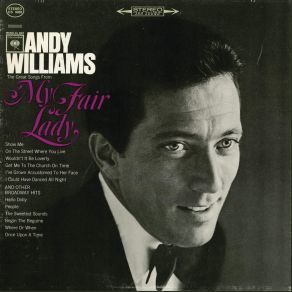The Great Songs from "My Fair Lady" and Other Broadway Hits
Download links and information about The Great Songs from "My Fair Lady" and Other Broadway Hits by Andy Williams. This album was released in 1964 and it belongs to Rock, Pop, Theatre/Soundtrack genres. It contains 12 tracks with total duration of 33:09 minutes.

|
|
|---|---|
| Artist: | Andy Williams |
| Release date: | 1964 |
| Genre: | Rock, Pop, Theatre/Soundtrack |
| Tracks: | 12 |
| Duration: | 33:09 |
| Buy it NOW at: | |
| Buy on iTunes $9.99 | |
Tracks
[Edit]| No. | Title | Length |
|---|---|---|
| 1. | On the Street Where You Live | 3:10 |
| 2. | I've Grown Accustomed to Her Face | 3:04 |
| 3. | I Could Have Danced All Night | 2:15 |
| 4. | Get Me to the Church On Time | 1:55 |
| 5. | Wouldn't It Be Loverly | 2:27 |
| 6. | Show Me | 1:59 |
| 7. | Hello, Dolly! | 2:55 |
| 8. | Where or When | 2:32 |
| 9. | Begin the Beguine | 3:13 |
| 10. | Once Upon a Time | 3:27 |
| 11. | People | 3:29 |
| 12. | The Sweetest Sounds | 2:43 |
Details
[Edit]Andy Williams took the opportunity of the release of the film adaptation of the Broadway musical My Fair Lady to record this album of show tunes, the first side devoted to My Fair Lady and the second to such contemporary songs as "Hello, Dolly" and "People" from Funny Girl. The material was first-class, and so was the singer, but the collection was marred by the overdone arrangements. Following his previous LP, The Academy Award Winning "Call Me Irresponsible" and Other Hit Songs From the Movies, which had featured ballad treatments of movie theme songs, Williams may have been going for a more swinging, up-tempo mood, but the busy charts, full of pizzicato strings, vocal choruses, and competing counter-melodies, distracted attention from the songs. The approach had some justification in an essentially comic song like "Get Me to the Church on Time," and a few of the arrangements did work, notably the bossa nova treatment of "Begin the Beguine" and the big band style of "The Sweetest Sounds." But too many times the singer seemed to be struggling against the orchestrations, such as when he was forced into an awkward falsetto at the end of "Once Upon a Time." What made all this even more annoying was that it was so unnecessary; if there were any songs that did not need to be so souped up, it was these well-written Broadway tunes. Despite the album's questionable musical qualities, it was a hit. "On the Street Where You Live," released as a single, reached the pop Top 40 and the Top Five of the easy listening charts, while the LP became Williams' fourth consecutive Top Ten, gold-selling album.